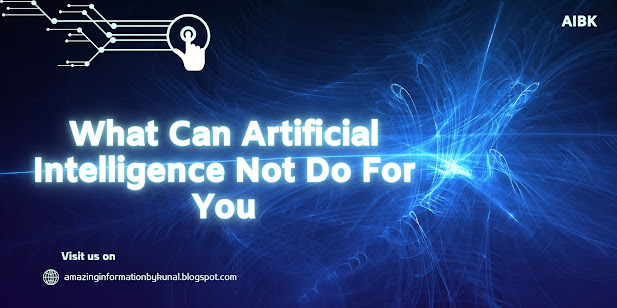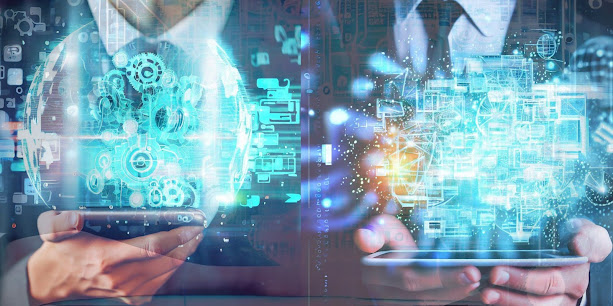Featured
- Get link
- X
- Other Apps
What Can Artificial Intelligence Not Do For You
In a world where technology continues to advance at a rapid pace, artificial intelligence (AI) has emerged as a powerful tool that can automate tasks, enhance decision-making, and even mimic human-like thinking. AI has impacted almost every facet of our lives, from virtual assistants like Alexa and Siri to self-driving cars and recommendation systems on streaming services. However, as impressive as AI is, there are still several things it cannot do for us. Let's explore the limitations of AI from a user's perspective.
Creativity and Imagination
One of the most profound aspects of human intelligence is creativity. AI may be able to generate art, music, or writing, but it does so by analyzing existing patterns and data. It is unable to genuinely envision or dream. We draw from our individual experiences and emotions to create works of art like novels, songs, and paintings that AI cannot duplicate.
Empathy and Emotional Understanding
While AI can recognize emotions based on facial expressions or text sentiment analysis, it can never truly empathize with our feelings. Humans are capable of thoroughly understanding and sharing the emotions of others. We offer comfort, connection, and solace in ways that AI simply cannot.
Morality and Ethics
AI operates based on algorithms and data, devoid of moral and ethical values. It can't make moral judgments or decisions that require a deep understanding of human values and societal norms. This is evident in the ethical dilemmas posed by self-driving cars. AI lacks the capacity to make complex moral choices.
Common Sense and Intuition
It is challenging to measure or recreate in AI systems the intuitive and natural sense that humans have by nature. We can follow our instincts or intuition, which frequently generates original ideas or productive outcomes. AI relies on data and patterns, making it less adaptable in situations that require intuitive leaps.
Adaptation to Unforeseen Situations
While AI excels at handling predefined tasks and scenarios, it struggles when faced with unexpected or novel situations. Humans can adapt quickly to new and unforeseen circumstances, drawing from their general knowledge and experiences, whereas AI typically requires reprogramming or retraining.
Complex Social Interactions
Although AI-driven chatbots and virtual assistants have improved, they still struggle to engage in truly meaningful and nuanced social interactions. AI frequently confuses or is unable to efficiently negotiate the subtle hints, humor, irony, and context that are a part of human speech.
Physical Dexterity and Sensory Perception
While AI may be excellent at processing data, crunching figures, and carrying out routine activities, it lacks human-like physical dexterity and sensory perception. Despite the fact that AI-powered robots can complete specified jobs, they lack the dexterity and adaptability of the human hand and sensory system.
Self-Awareness and Consciousness
Perhaps one of the most fundamental limitations of AI is its lack of self-awareness and consciousness. AI systems are tools that process data and carry out algorithms; they are devoid of consciousness. Human consciousness remains a profound mystery that AI cannot replicate.
Judgment and Wisdom
Wisdom comes from a combination of knowledge, experience, and good judgment. AI can process vast amounts of information and make predictions, but it can't truly understand the depth and nuance of human experiences or offer the kind of wisdom that comes with age and reflection.
Value-Based Decision-Making
AI is capable of making decisions that are optimum for a specific set of goals, but it is unable to generate values or take actions that are consistent with human values. AI is unable to fully comprehend the intricate process of determining what is right or wrong, just or unjust, which is based on cultural, ethical, and personal values.
Subjectivity and Personal Preferences
Each individual has unique tastes, preferences, and subjective experiences. AI may recommend products, movies, or music based on user data, but it can't fully understand the deeply personal and subjective aspects of taste and preference.
Innovation and Discovery
While AI can assist in data analysis and pattern recognition, it cannot innovate or discover new ideas in the same way humans can. Innovation often arises from a creative process that combines existing knowledge in novel ways, something AI struggles with.
Human Connection and Relationships
AI may provide virtual companionship, but it cannot replace the depth and richness of human connections and relationships. The bonds we form with family, friends, and loved ones are built on emotions, shared experiences, and a sense of trust that AI can't replicate.
Conclusion
Despite artificial intelligence has come a long way and is still changing how we live, it is crucial to understand its inherent limitations. Although extremely skilled in some fields, artificial intelligence (AI) lacks the complexity of human intellect, emotions, and consciousness. As users, we should appreciate AI for what it can do while also realizing that it will never be able to replicate the qualities that make us truly human—creativity, empathy, intuition, and the depth of our experiences. It is crucial to establish a balance between the usefulness of AI and the protection of our uniquely human traits as it develops.
- Get link
- X
- Other Apps
Popular Posts
Failures - The Best Source of Inspiration
- Get link
- X
- Other Apps



Comments
Post a Comment